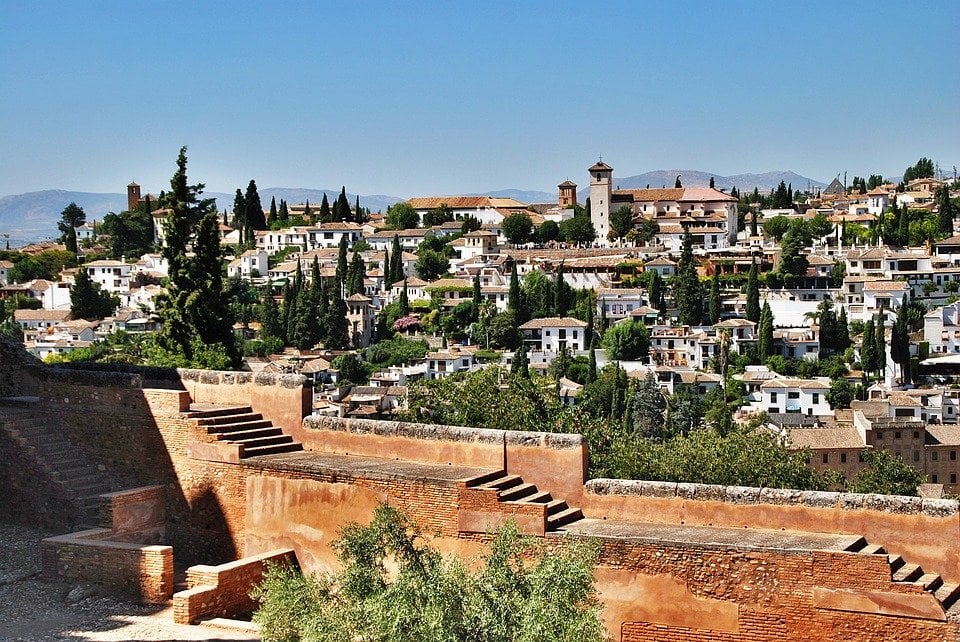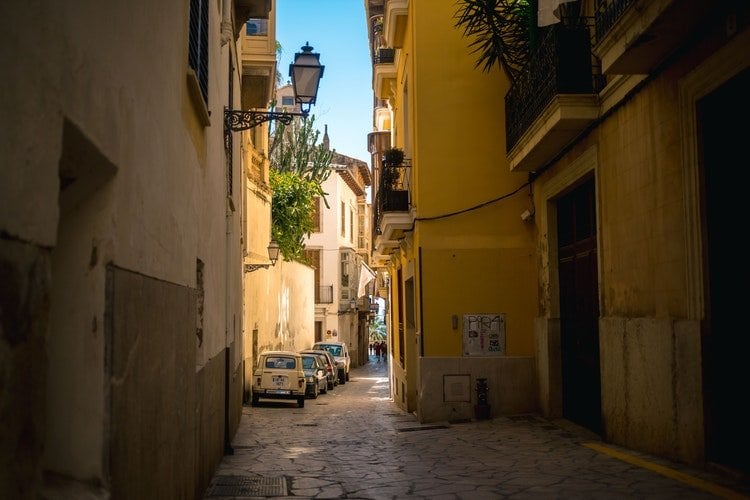The 7 Best Cities for Teaching Abroad in Spain
We’ve narrowed down a list of seven of the best places in Spain for English teachers!

You’ve weighed the pros and cons, crunched the numbers, told your parents, and decided to make the life-changing move to Spain to teach English. That’s the easy part. Deciding where you want to live in Spain, however, is where things get difficult. Should you live in a big or small city? Do you want sunshine and beaches most of the year or would you rather the temperamental climate of the mountains? Do you want to live near other English speakers or not so much?
I grew up in a small town, so when it came time to choose where to live, I knew I wanted a taste of the big city. I was debating between Madrid and Barcelona, but while doing my research I discovered that most locals in Barcelona prefer to speak Catalán, not Spanish. Since improving my Spanish was a big priority for me, I packed up and moved to Madrid and got exactly what I wanted: the hustle and bustle of city life, lots of Spanish speakers, and the teaching experience of a lifetime.
Though your work as a teacher will comprise a large part of your day, where you choose to live in Spain will play a big part in what kind of experience you have, influencing what you do during your free afternoons, what foods you try, where you go during holidays, and even what language you learn!
Luckily, Spain has something for everyone. With 17 autonomous communities and 2 autonomous cities, Spain’s cultural and geographic diversity means that there are lots of fantastic places to live, and at least one of these places has exactly what you’re looking for. To make things a little easier for you, we’ve narrowed down a list of seven of the best places in Spain for English teachers.
Madrid

The capital of Spain, Madrid is a city of about 3.2 million people located smack dab in the middle of the country. It’s not a very flashy city -- its tourist attractions are limited and it has no amazing landscapes to speak of -- but that just makes it all the better to live in.
For teachers, Madrid has by far the best resources and opportunities. Almost all Spain teaching programs have positions in Madrid, and it has plenty of private academies that are looking for native speakers to teach after school. People all over the city are willing to pay upwards of 20€ an hour for native speakers willing to tutor their children. And, although Madrid is more expensive than other parts of Spain, the higher pay makes up for it.
Though there are enough English-speakers and expats in Madrid that you can get by without knowing Spanish, it’s not so tourist-ridden that it becomes impossible to practice, especially if you take the time to explore outside the city center. In addition to its bustling nightlife, which ranges from the hipster hangouts in Malasaña to the active LGBTQ scene in Chueca, Madrid has two top-tier soccer teams (Real Madrid and Atlético Madrid), great food, and plenty of green spaces where you can enjoy the weather and watch your fellow madrileños roller skate or walk their dogs.
Madrid is divided into 17 districts, all of which are connected by an efficient metro system and public buses, making it easy to get from one part of the city to another. It’s connected the rest of Spain by high-speed train and an extensive bus network. Its Barajas Airport has affordable flights to any part of the country and the rest of Europe.
Suggested Teaching Opportunities in Madrid:
- Teach English in Madrid with CIEE
- Teach English in Madrid with a TEFL Certification from ITA
- Teach & Learn in Madrid with Instituto Franklin-UAH
Barcelona

Madrid’s rival in soccer and pretty much everything else, Barcelona is Spain’s most popular destination for foreigners. It’s not hard to see why -- nestled on the Mediterranean coast, Barcelona has near-perfect weather year-round and is filled with color, from Gaudi's architectural masterpieces to the diversity of the people lining up to see La Sagrada Familia every morning.
Because it’s such an international city, there are plenty of opportunities for English teachers, from summer camps to private academies to homestays. This makes it a popular destination for teachers, so you will certainly have no trouble finding other expats to bond with. When making friends with locals, however, keep in mind that Spanish is not the main language -- barceloneses speak Catalán, and this plays an important part in their identity. Though almost everyone can speak Spanish as well, changing your buenos días into a bon dia would certainly be appreciated.
Barcelona’s nightlife is just as active as Madrid’s, but its geography has the upper hand -- by day, there are plenty of breathtaking beaches, parks, and it’s worth taking a day trip to hike the mountains nearby. Spend an evening out sampling pintxos (the northern equivalent of tapas), or wander through the narrow streets of the Gothic Quarter.
Barcelona is divided into 10 districts, but it houses an easy-to-use metro system that can connect you to even the furthest points of the city. It is also connected to the rest of Spain (and to France) via high-speed train, and the El Prat airport can take you almost anywhere in Spain and Europe within just a few hours.
Suggested Teaching Opportunities in Barcelona:
- Become a Language and Culture Assistant in Barcelona through the Spanish Ministry of Education
- Become a Language Assistant in Spanish Schools through Meddeas
- Teach English in Barcelona with LanguageCorps
Seville

The capital of the southern province of Andalusia, Seville is quintessentially Spanish -- the uncomfortable heat, the flamenco, the tapas. Seville is the hottest major city in Europe, but thankfully its color and charm provide welcome relief.
As the most populous city in the province, Seville is a great option for those who like cities but need something more affordable. There are several teaching programs and TEFL courses in Seville, and it has a small but lively expat community. It also has easy-to-use public transportation; should you want to teach in any Andalusian pueblo a little further away, Seville would be a good base. Seville also part of Spain’s high-speed rail network, and is a hub for buses to other parts of the country, such as Granada and Málaga.
Every year during Easter, Seville’s hosts Spain’s most famous and elaborate Semana Santa celebrations, and the Feria de Seville that follows it brings out the city in its full glory: parades, dancing, music, food and drink, and sevillanos dressed up in their traditional clothing.
But outside of April, there is still plenty to do -- with La Giralda and the Real Alcazar, Seville has some of Spain’s most impressive Moorish architecture, and its Plaza de España is unlike any other in the country. Flamenco shows, or tablaos, can be found all over the city, and unlike other big cities in Spain, most tapas at bars are free!
Andalusia is also home to one of Spain’s most distinct accents, with dropped s, slurred word endings, and a very rapid speech pattern. This could make things difficult for a beginning Spanish-speaker, but luckily Andalusians are a friendly and welcoming bunch. You’ll be making friends in no time.
Suggested Teaching Opportunities in Seville:
- Teach English in Seville with CIEE
- Teach English in Seville with a TEFL Certification from ITA
- Become a Language and Culture Assistant in Seville through the Spanish Ministry of Education
Granada

Granada is a thriving university town a little over three hours away from Sevilla by bus. Situated at the foot of Spain’s Sierra Nevada mountains, it’s a medium-sized city known for its breathtaking views and unique history.
The city is overlooked by the Alhambra palace and its gardens, an exquisite Moorish fortress completed in the 14th century. This makes it a popular tourist destination, but it’s got lots more to do and see -- university students keep Granada’s nights full of music and energy, and its bars are known for giving generous tapas. For outdoor lovers, the beach and the mountains are each just a mile away, so your weekends could be spent either doing anything from hiking and skiing to snorkeling or lazing about on the beach.
Granada houses a few major private academies that you can teach for, and it also is a hotspot for tutoring. Though your hourly rate might not be as much as it would be in a bigger city, the lower cost of living makes up for it. And, though it’s a small and walkable city, the bus system is affordable in case you don’t quite feel like walking up and down its hills. The Federico García Lorca airport is connected to a limited number of cities, but it’s quite easy to get a bus to nearby Málaga to catch a flight -- or just take a bus all the way to Sevilla or Madrid.
Suggested Teaching Opportunities in Granada:
- Teach English in Granada with CIEE
- Become a Language and Culture Assistant in Granada through the Spanish Ministry of Education
- Teach English in a Homestay through Greenheart Travel
Valencia

Tucked into Spain’s eastern coast, Valencia is the country’s third-largest city, with upwards of 700,000 people. Just a quick, two-hour train ride from Madrid and three hours from Barcelona, it’s a major Mediterranean port, and it’s known for its warm beaches, delicious food, and unique culture.
Because of all the business that comes through, English teachers will have no trouble finding an academy to hire them, and there are several TEFL certification programs in Valencia. For its size, Valencia is very affordable, so it’s a popular expat destination for teachers and digital nomads alike, with lots going on: plenty of festivals, miles of beautiful neighboring beaches, and hiking. As a plus, it’s extremely bike friendly, as it’s flat and has 120 km of cycling routes along the shoreline and river.
No description of Valencia, however, would be complete without mentioning paella. One of Spain’s most famous dishes, paella valenciana is colorful and delicious, and most commonly made with rabbit. But paella isn’t the only food that makes Valencia famous -- on a hot summer day, try drinking orxata.
Once a year, Valencia hosts one of Spain’s most famous celebrations: Las Fallas. On March 15, giant statues (called ninots) made of wood, papier-mache, plaster, and cardboard are constructed all over the city, often with political and satirical themes. Special treats are sold during this time, and people take part in fiestas both day and night until March 19, where everything culminates when the ninots are set ablaze and people drink, laugh, and dance in the streets. If you’re in Valencia, you can’t miss it!
Suggested Teaching Opportunities in Valencia:
- Teach English in Valencia with My TEFL Experience
- Teach English in Valencia with a TEFL Certification from ITA
- Become a Language Assistant in Spanish Schools through Meddeas
Palma de Mallorca

If you’ve always dreamt living on an island paradise, teaching English in Palma de Mallorca is your chance to do so. It’s the capital and largest city of the Balearic Islands, a popular destination for northern Europeans looking for a getaway, and also a great place to teach English.
Like any other city in Spain, there are plenty of private academies that hire year-round, and many people are willing to pay for private lessons as well. Additionally, several of the most popular teach-in-Spain programs, such as the Auxiliares program, have positions in Palma. Even though it’s a popular tourist destination and has quite a few expats, Palma is affordable for a teacher on a modest salary, and it’s quite easy to move around the island on its bus system.
Though the island itself is just over 3,600 km squared, there’s no need to worry about getting island fever. Mallorca has endless coves, calas, and ethereal hidden beaches at your doorstep. It’s totally realistic to teach in the morning and hit the shores in the afternoon. But even if you get sick of beaches, there’s still plenty to do -- Mallorca’s mountains make room for beautiful hikes, and plenty of historical monuments for you history buffs.
Suggested Teaching Opportunities in Palma de Mallorca:
- Become a Language Assistant in Spanish Schools through Meddeas
Bilbao

With cool summers and wet winters, Bilbao is the unofficial capital of Basque Country, a province known for its unique cultural identity and for the Euskadi language its locals speak. As a result, it has a different flavor from the rest of Spain.
Bilbao is the major financial center of northern Spain, so you can get your TEFL certification and work at one of several private academies. It’s a wealthy region with a thriving expat community that has a much more “European” feel to it. It comes at a price, however: Bilbao’s wealth means that it is also more expensive than other cities in Spain.
It is just one and a half hours away from San Sebastian, Spain’s classy gastronomic capital and beautiful resort town, and two hours away from world-class wine tasting in Spain’s La Rioja region. The Basque region is full of greenery, mountains, and fantastic views (if weather permits), making it a great base for nature-lovers. But even within the city, there’s plenty to do: The Guggenheim, a modern art museum that rather resembles a space palace, and it’s casco viejo, or Old City, is the perfect place to sample the Basque Country’s famous pintxos. ¡Kaixo!, (hello) Bilbao
Suggested Teaching Opportunities in Bilbao:
- Teach English in Bilbao with a TEFL Certification from ITA
- Become a Language Assistant in Spanish Schools through Maddeas
At the end of the day, however, every place has its own charm and advantages -- it's up to you to make the most of it. Whether you opt for the big city life in Madrid or choose the slow-paced island life in Palma, you're guaranteed to have a fantastic living, learning, and teaching experience in Spain.

